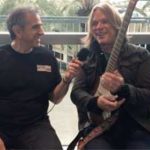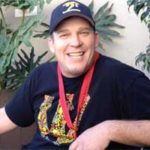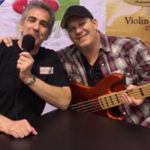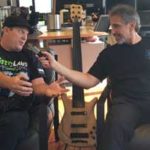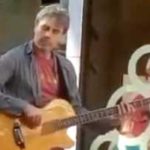The Police guitarist reflects on 30 years of solo work and more…
By Gary Graff
May 12, 2017
A title like Triboluminescence seems perfect for an Andy Summers album. For starters, it sounds like made-up word, not unlike some of the early Police album titles. But when you find out it’s an actual scientific word that means “striking something and creating light from dark,” it applies exactly to what Summers does with his music. The British guitarist is an auteur, someone who values the different and the unique. There’s a significant avant garde and experimental aspect to Summers’ work — his term for it is “the quest” — and a taste for the exotic, with melodies, rhythms and counterpoints from all over the world for his own albums, collaborations or soundtrack work (not to mention some pretty artful photography as well). It doesn’t keep him on the pop charts, or in arenas and stadiums, like he was with the Police, but it does make Summers dependably original and offers a sonic adventure every time he picks up a guitar…
FGPO: It’s 30 years this year since you released your first solo album. What do you know now that you didn’t know then?
Summers: Well, I have to say, I think I’ve been very lucky to be able to make all these records and have the help I’ve had over the years. I’ve enjoyed all of it. I think back over all the moments I’ve had making all these different records; mostly it was great fun for me and something I completely enjoyed, and I’m basically just continuing on. I don’t see stopping at any point in the near future. There’s plenty of creative juice left.
FGPO: You’ve been at this since you were a teenager, but you were influenced by and sourced players who were, in fact, lifers. Was that at all in your mind during the early stages of your career?
Summers: Y’know, when you’re a kid starting out you say: “That’s what I’d like to do. I’d like to be a creative artist and make these records and have all the fun of that creativity” and, y’know, I did it, and for me it’s great. But then you have the pressure of trying to push on and create something new in today’s world. That’s what gets you out of bed in the morning.
FGPO: So what led you to Triboluminescence?
Summers: It is all very sonic; that’s how these pieces start. I made Metal Dog last year, which was very well-received. That emerged from another project that wasn’t intended to be an album at all. At the time, it didn’t pan out, so I had all these tracks going on and I formed it into the CD that became Metal Dog. That got me really fired up again and got me in the studio, and because it went well I was sort of interested in continuing on.
FGPO: Is there a particular process you subscribe to?
Summers: I really enjoy being in the studio alone, like being a one-man band, if you like, and playing everything and just having that kind of complete freedom rather than reducing an album into two or three afternoons with other players. So it just takes time and slowly piecing together these things.
FGPO: Like a mad scientist.
Summers: It’s very much like painting or something; you go in and take out yesterday’s work and today’s thought which you think is better, and three days later you may change that as well. There’s a lot of addition and subtraction in these tracks; you literally sort of carve it into a place where you think it’s all right.
FGPO: Is there a usual starting point that’s most fruitful?
Summers: Most of the tracks, rather than sitting down and composing them fully and saying: “It’s all this and all that,” what I do is very free-form. I usually start the tracks with sound; I look for a sonic quality. I’m always on the lookout for strange and exotic sounds, so I’ll hook various guitar pedals together in some way or I’ll have a completely detuned guitar or I’ll play with drumsticks instead of my hand and things like that until I get something going where I go: “Yeah, that’s kind of intriguing. I’ll record that.” And I’ll do 16 or 32 bars of it and see if I can play drums against it or find a rhythm, or if inspires some melodic enhancement. I’m waiting for it to inspire more creativity in me once I’ve found the sound. It’s really no different than sitting down at a piano and searching around for the next chords. There’s a lot that goes into it.
FGPO: How much does gear factor into this?
Summers: Well, it’s not that I’m a pedal junkie, as they call it. But as I’m interested in exotic sounds, as a guitarist we’re in this sort of golden age or renaissance of guitar pedals. It’s amazing; everyone’s realized all these years later they’re not novelty sounds. They’re serious things, these guitar pedals, that you can color and change and create with. So I keep an ear to the ground if anybody’s coming up with anything different; matter of fact, I’m waiting on delivery of a few now. And of course I use Roland equipment; I’ve got their drums, which are wonderful, and I’ve got a 505 looper, which I just started using and is a fantastic machine. So there’s some great stuff around.
FGPO: Do you have the kind of rep where if someone comes up with something new they go: “Let’s call Andy. He’ll want one!”
Summers: Oh yeah. [laughs] I used to find out about a pedal and just go to the store and buy one. I realized one day: “Well, if I just call the guy I’ll get given them,” which I’m very fortunate for. But mostly people offer me their pedals, and I’m very happy. It’s a strange little thing, these people all over the U.S. who make guitar pedals. Most of them are kind of nerdy and very nice kind of people. They’re completely into what they’re doing, so I’ve had some special pedals made for me that other people haven’t got. But I encourage it, because I think it’s a lot of artistry and craftsmanship and complete dedication to it. I don’t have any cynicism about that at all. I encourage it. It’s all part of the quest.
FGPO: It’s 25 years this year since you released the first of your two albums with Robert Fripp. What was it like working together?
Summers: We had a really nice time. We’re two English guys, blokes, come from the same town, about the same age, actually passed through the same band at one point. But we’d never played together. It was a real collaboration; I remember quite clearly, we met in New York and said: “What are we gonna do?” I’d say: “How about this?” He’d say: “I think I’ve got something that can go over that” and somehow we eventually cobbled together what eventually became the two albums together. And they were successful; I don’t look back on them very often but they caught a lot of people’s attention, and I think they’re pretty influential records, often cited.
FGPO: Also in the realm of anniversaries, it’s 40 years since the Police formed. What’s that feel like?
Summers: It feels more like 40 minutes ’cause it’s such a vivid experience. It lives on. We don’t get very far away from it. It’s around us all the time. There’s going to be a huge repackaging and selling of everything next year.
FGPO: Is that something the three of you willingly take part in?
Summers: Yeah. Usually whatever’s going on comes through a lawyer: “What do you think of this? Do you approve this? Does everybody want to sign off on this?” So we’re all consulted about everything. Sometimes stuff comes out and we didn’t approve it, and we get upset about it. There’s one half of you that just doesn’t care, ’cause it was such a long time ago, but another part is that you do care. You do care about what they nowadays call “The Brand” and making sure it serves you in the right way. It’s still our work, after all. It’s something we’re all proud of.
FGPO: A Police reunion was a hot rumor for this year’s Desert Trip festival for a minute, but Sting tells us he thinks you guys are too young to be on that bill.
Summers: [laughs] That’s a good attitude. It’s promoted for an incredible amount of money; when they offer you $9 million to go and play for an hour you go: “I might want to do that,” but I don’t think it’s going to happen. I would do it, I think. Everyone always says: “Oh, you are gonna play again, aren’t you?” It’s just an open door. The world changes all the time, so who knows what might be possible.

